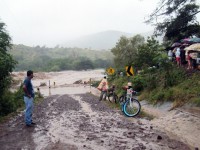Project: Increasing the Resilience of Informal Settlements to Climate Change in Two Latin American Cities
Team: I2UD, Alfredo Stein, Mauricio Javier Rodriguez Gomez (Colombia), Luis Enrique Sevilla Fajardo (Nicaragua)
Sponsor: The Lincoln Institute of Land Policy
Project Duration: August 2012 – January 2014
In Central and South America, climate change is expected to aggravate both the severity of precipitation and the lengths of dry seasons. Furthermore, microclimatic fluctuations triggered by El Niño are expected to intensify. Although informal settlements bear the brunt of vulnerability to the effects of climate change, they are often not included in risk assessments and city adaptation strategies.
In partnership with the Lincoln Institute for Land Planning, I2UD conducted a study on local urban planning and management practices to equip informal settlements to handle climate change. The municipalities of Cartagena (Colombia) and Condega (Nicaragua) provide the context for grounding this study in political, economic, and social realities.
Over one-third of Cartagena’s population of 923,414 lives below the poverty line. Climate change-related risks include flooding, beach erosion, depletion of fisheries, damage to infrastructure and cultural heritage and increase in mosquito-borne diseases. The city has developed guidelines for climate change adaptation, focusing primarily on sea level rise and protection of investments, industrial and tourism assets.
Set among hilly terrain in Nicaragua’s interior, a large proportion of Condega’s population of 29,247 live in landslide-prone areas. Lack of enforcement of regulations, poor quality construction, and environmental degradation increase vulnerabilities. Throughout, limited fiscal resources and a legacy of complicated land ownership constrain the ability of the municipality to address risks proactively.
During the study, the team examined changes in the interaction of land policies and adaptation measures, with a focus on informal settlements to highlight the social dimension of risk exposure. The team developed a climate change adaptation framework based on the documentation of climate change effects and adaptation approaches by the International Panel on Climate Change, but focusing on risks in informal and lower-income settlements. It incorporates basic guidelines that apply fundamental principles found in current climate and urban planning literature to these settlements.
The full study will be released by the Lincoln Institute as a working paper later in 2014.

